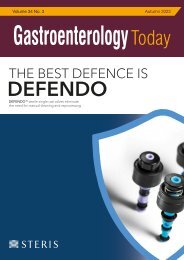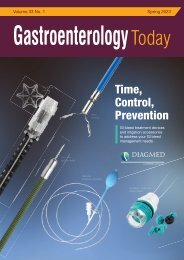You also want an ePaper? Increase the reach of your titles
YUMPU automatically turns print PDFs into web optimized ePapers that Google loves.
Getting on with<br />
their lives<br />
By getting on with<br />
their steroid<br />
For autoimmune hepatitis<br />
The only budesonide with three indications<br />
For induction of remission of mild to moderate active<br />
ileo-caecal Crohn’s disease<br />
For induction of remission of active collagenous colitis<br />
Budesonide, the Dr Falk way<br />
Efficacy localised at the site of the diseases 1-4<br />
Limiting the risk of systemic side effects 2-4<br />
Prescribing Information (Please refer to full SPC before prescribing)<br />
Presentation: Budenofalk ® gastro-resistant granules, each sachet<br />
contains 9mg budesonide, Budenofalk ® gastro-resistant capsules, each<br />
containing 3mg budesonide. Indications: Induction of remission of<br />
mild to moderate active Crohn’s disease affecting the ileum and/or the<br />
ascending colon. Induction of remission of active collagenous colitis.<br />
Autoimmune hepatitis (capsules only). Dosage: Adults: For Crohn’s<br />
disease and collagenous colitis: one sachet or three capsules daily with<br />
liquid half an hour before food, without chewing or crushing, or one<br />
capsule three times daily. Limit treatment to 8 weeks, then withdraw<br />
gradually. For autoimmune hepatitis: one capsule three times daily.<br />
Possibly combine with azathioprine. Maintenance of remission: one<br />
capsule twice daily. Revert to 3 capsules daily if transaminases ALAT and/<br />
or ASAT elevate again. Treat until remission is achieved or 24 months.<br />
Children: Not recommended; safety and efficacy not established. Contraindications:<br />
hypersensitivity to any constituent. Hepatic cirrhosis.<br />
Warnings/Precautions: Change from other steroids may result in<br />
symptoms due to reduced systemic steroids. Use with caution in patients<br />
with tuberculosis, hypertension, diabetes mellitus, osteoporosis, peptic<br />
ulcer, glaucoma, cataracts or family history of glaucoma or diabetes or any<br />
condition in which glucocorticosteroids may have undesirable effects.<br />
Not appropriate for upper GI Crohn’s or extraintestinal symptoms.<br />
Long term, high dose use may result in glucocorticosteroid systemic<br />
effects. Infection: suppression of the inflammatory response and<br />
immune function increases susceptibility to infections and their severity.<br />
Clinical presentation of infections may be atypical and presentation of<br />
serious infections may be masked. Chickenpox and herpes zoster are<br />
of particular concern. Passive immunisation needed within 10 days in<br />
exposed non-immune patients taking systemic glucocorticosteroids.<br />
Urgent specialist care required on confirmed chickenpox. Give normal<br />
immunoglobulin immediately after measles exposure. Do not give<br />
live vaccines to those with chronic glucocorticosteroid use. Antibody<br />
response to other vaccines may be diminished. With severe liver<br />
function disorders: increased systemic bioavailability. Central serous<br />
chorioretinopathy or other causes may result in blurred vision/visual<br />
disturbances. Consider referral to ophthalmologist. Suppression of<br />
the HPA axis and reduced stress response: supplementary systemic<br />
glucocorticoid treatment may be needed. Avoid concomitant treatment<br />
with CYP3A4 inhibitors. Do not use in patients with galactose or fructose<br />
intolerance, glucose – galactose malabsorption, sucrase – isomaltase<br />
insufficiency or Lapp lactase deficiency or congenital lactase deficiency.<br />
In autoimmune hepatitis evaluate transaminase levels every 2 weeks<br />
for the first month and then every 3 months. Interactions: Co-treatment<br />
with CYP3A inhibitors including cobicistat containing products may<br />
increase side effects and should be avoided where possible. Beware<br />
concomitant administration of cardiac glycosides and saluretics.<br />
CYP3A4 inhibitors: avoid concomitant administration. CYP3A4<br />
inducers: may reduce systemic and local exposure, necessitating dose<br />
adjustment of budesonide. CYP3A4 substrates: may compete with<br />
budesonide increasing plasma concentrations depending on relative<br />
affinities. Small, non-significant effect of cimetidine on budesonide<br />
kinetic effects. Oestrogens/oral contraceptives may elevate plasma<br />
concentrations and enhance corticosteroid effects. Steroid-binding<br />
compounds and antacids may reduce budesonide efficacy; administer<br />
at least 2 hours apart. Because adrenal function may be supressed,<br />
an ACTH stimulation test for diagnosing pituitary insufficiency might<br />
show false results (low values). Use in pregnancy and lactation: Avoid<br />
use in pregnancy unless essential. Do not breastfeed during Budenofalk<br />
treatment. Undesirable effects: Cushing’s syndrome, growth retardation<br />
in children, glaucoma, cataracts, blurred vision, dyspepsia, abdominal<br />
pain, constipation, gastric or duodenal ulcers, pancreatitis, increase in<br />
risk of infections, muscle and joint pain and weakness and twitching,<br />
osteoporosis, osteonecrosis, headache, pseudotumor cerebri (including<br />
papilloedema) in adolescents, depression, irritability and euphoria,<br />
www.drfalk.co.uk<br />
Dr Falk Pharma UK Ltd, Unit K, Bourne End Business Park, Cores End Rd, Bourne End, SL8 5AS. Registered in England No: 2307698<br />
psychomotor hyperactivity, anxiety, aggression, allergic exanthema,<br />
petechiae, ecchymosis, contact dermatitis, delayed wound healing,<br />
increased risk of thrombosis, vasculitis (after withdrawal from longterm<br />
treatment), fatigue, malaise. Side effects characteristic of systemic<br />
glucocorticosteroid therapy may occur. Exacerbation or reappearance of<br />
extraintestinal manifestations when switching from systemically acting<br />
glucocorticosteroids may occur. Frequency is likely to be lower than<br />
with equivalent dosage of prednisolone. Legal category: POM. Costs:<br />
UK NHS: 60 sachets £135.00; 100 capsules £75.05. Ireland (PtW):<br />
60 sachets: €149.49; 100 capsules: €78.96. Licence holder: Dr Falk<br />
Pharma GmbH, Leinenweberstr.5, D-79108 Freiburg, Germany. Licence<br />
numbers: (granules) PL08637/0020 (UK) PA573/2/3 (IE) (capsules)<br />
PL08637/0002 (UK) PA573/2/1 (IE). Prepared: February <strong>2019</strong>.<br />
Further information available on request.<br />
Adverse events should be reported. Reporting forms and information<br />
can be found at www.mhra.gov.uk/yellowcard or search for MHRA<br />
Yellow Card in the Google Play, Apple App Store (UK residents) or<br />
at email: medsafety@hpra.ie or at http://www.hpra.ie/homepage/<br />
about-us/report-an-issue/human-adverse-reaction-form (residents<br />
in Ireland). Adverse events should also be reported to Dr Falk<br />
Pharma UK Ltd.<br />
References:<br />
1. Bar-Meir S et al. Gastroenterol 1998; 115(4): 835-40. 2. De Cassan C<br />
et al. Dig Des 2012; 30(4): 368-75. 3. Czaja AJ. Dig Dis Sci 2012; 57(8):<br />
1996-2010. 4. Miehlke S et al. Gastroenterol 2002; 123(4): 978-84.<br />
DrF19/003<br />
Date of preparation: March <strong>2019</strong>

















